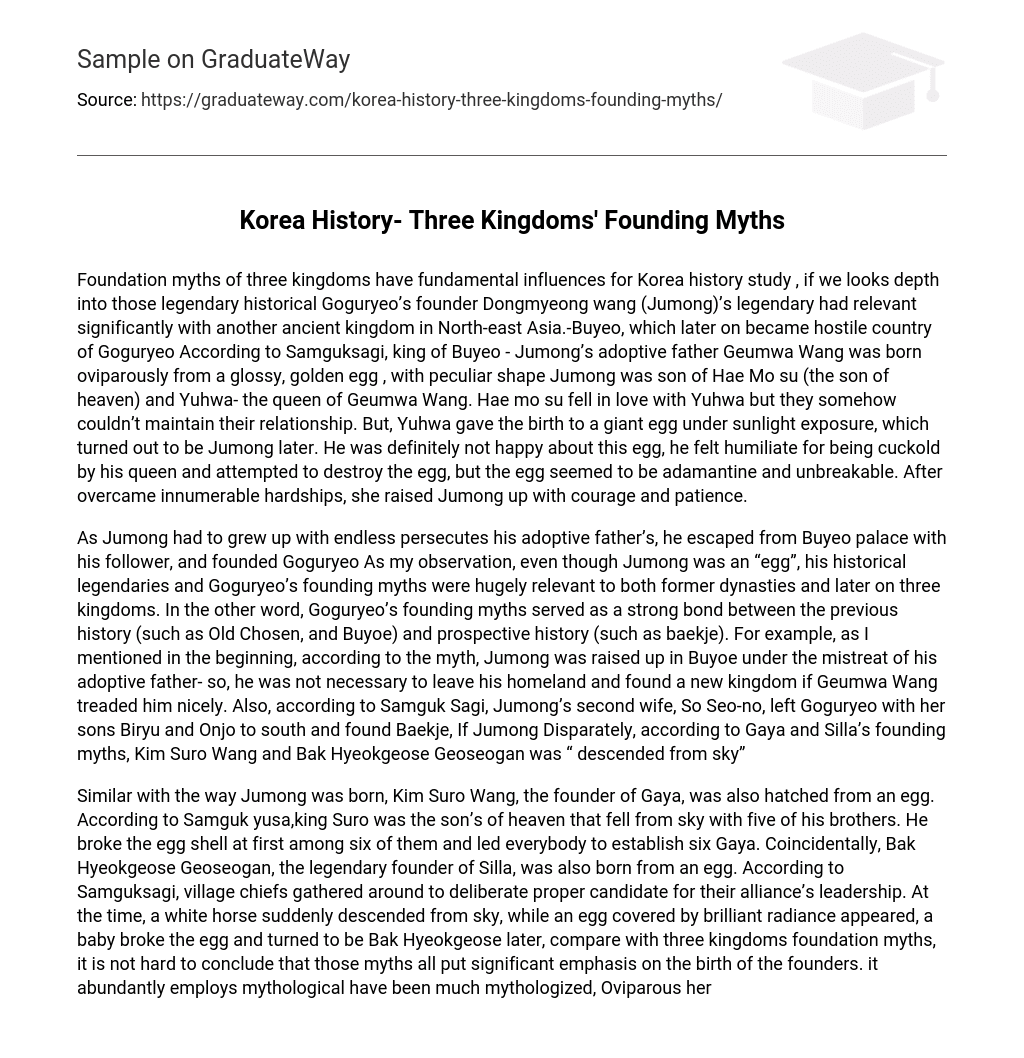The foundation myths of three kingdoms have a profound impact on the study of Korea’s history. If we delve deeper into the legendary histories, we can see that Goguryeo’s founder Dongmyeong wang (Jumong) has significant connections with another ancient kingdom in North-east Asia called Buyeo, which later became a hostile country to Goguryeo. According to the Samguksagi, Jumong’s adoptive father, King Geumwa Wang of Buyeo, was born from a glossy, golden egg with a unique shape. Jumong, on the other hand, was the son of Hae Mo su (the son of heaven) and Yuhwa, who was the queen of Geumwa Wang. Although Hae mo su and Yuhwa were unable to maintain their relationship, Yuhwa gave birth to a giant egg under sunlight exposure, which later turned out to be Jumong. Geumwa Wang was displeased with this situation as he felt humiliated for being cuckolded by his queen, so he attempted to destroy the egg. However, the egg proved to be indestructible. Despite facing countless challenges, Yuhwa raised Jumong with courage and patience.
As Jumong grew up enduring endless persecutions from his adoptive father, he escaped from the Buyeo palace with his follower and founded Goguryeo. In my observation, although Jumong was mistreated, his historical legendaries and the founding myths of Goguryeo were highly relevant to both former dynasties and the later three kingdoms. In other words, Goguryeo’s founding myths served as a strong bond between the previous history (such as Old Chosen and Buyeo) and the prospective history (such as Baekje). For example, as mentioned earlier, according to the myth, Jumong was raised in Buyeo under the mistreatment of his adoptive father. Thus, he would not have needed to leave his homeland and establish a new kingdom if Geumwa Wang had treated him nicely. Additionally, according to Samguk Sagi, Jumong’s second wife, So Seo-no, left Goguryeo with her sons Biryu and Onjo to the south and founded Baekje. If Jumong had not done so despairingly, according to Gaya and Silla’s founding myths, Kim Suro Wang and Bak Hyeokgeose Geoseogan were “descended from sky”.
Just like Jumong, Kim Suro Wang, the founder of Gaya, was also born from an egg. According to Samguk yusa, King Suro and his five brothers fell from the sky and he was the first to break the egg shell. He then led everyone to establish six Gaya. Similarly, Bak Hyeokgeose Geoseogan, the legendary founder of Silla, also hatched from an egg. According to Samguksagi, village chiefs gathered to find a suitable leader for their alliance. Suddenly, a white horse descended from the sky and an egg covered in bright light appeared. A baby broke the egg and later became Bak Hyeokgeose. Comparing these foundation myths with those of the three kingdoms, it is evident that the birth of the founders holds great significance. These myths heavily rely on mythological elements and frequently feature oviparous heroes and maternity-centered backgrounds in ancient Korean literature.
The belief in sun worship is a primitive and universal one, which is evident in the ancient Koreans’ belief in the oviparous myth.





